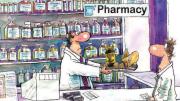Each year, about 19 million adult Americans report the onset of depression, according to the National Institute of Mental Health. That’s 9.5 percent of our adult population. In Japan and Korea, the figure is drastically loweraround 2 percent. Pondering this disparity, scientists noticed that the least depressed populations, mostly in Asia and Scandinavia, are also those with diets rich in oily fish like salmon and tuna. At the other end of the depression spectrum are countries whose citizens consume the smallest amounts of such fishplaces like New Zealand and France, for example, where the incidence of depression is 11 and 16 percent, respectively. Even after factoring in reporting differences caused by societal attitudes about mental health, the discrepancy seems too wide to be mere coincidence.
It doesn’t take a big leap to wonder whether omega-3 fatty acids, nutrition’s latest darling, might be the reason. Oily fish are loaded with omega-3s, which are purported to prevent heart disease, mitigate attention deficit disorder, and stave off Alzheimer’s disease. Now a team of researchers at Harvard-affiliated McLean Hospital has found that rats respond to omega-3s the same way they do to antidepressant drugs such as Prozac and Zoloft.
The investigators engineered a special omega-3-rich rat food by adding fish oil to the regular grain-based chow. Then they measured how quickly the rats stopped swimming when placed in clear Plexiglas cylinders filled with water. The pharmaceutical industry considers the “forced-swim” test a reliable gauge of whether an antidepressant drug works; rats that have consumed drugs proven effective at treating human depression will swim longer before they give up and tread water just enough to keep their heads above the surface. Rats tested after 30 days on the omega-3 food swam 70 percent longerabout three minutes and 20 seconds, versus two minutes flat for the control group. The scientists found similar results when they laced chow with uridine, a chemical that the body’s cells use to metabolize carbohydrates.
The “reward system” works the same way in rats’ brains as it does in the brains of humans and other vertebrates, and the parallels to our species seem obvious. “People who are depressed give up on things much more quickly,” says associate professor of psychiatry William Carlezon, lead author of the report on the study, published in February in Biological Psychiatry. But Carlezon is careful to note that the scientists don’t know whether omega-3s and uridine made the rats less depressed. (Rodents are notoriously inarticulate about their feelings.) The researchers know only that on the forced-swim test, the rats respond to the substances the same way they do to Prozac.
The researchers do have reason to believe omega-3s act on parts of the brain that make us depressed. In separate research, professor of psychiatry Perry F. Renshaw, a coauthor on the Biological Psychiatry paper, used magnetic resonance imaging to find that depressed people’s brains have stiffer cell membranes. If the cell membranes are an ocean, and neurotransmitter receptors are buoys afloat on that ocean, brain function suffers when the membranes become rigid and the receptors can’t float as freely. Cholesterol stiffens the membranes; omega-3s have the opposite effect. Uridine, meanwhile, helps all the body’s cells burn cleaner by aiding their mitochondria in making energy.
There are plenty of simple ways to add omega-3 fatty acids to one’s diet: oily fish, fish-oil supplements, walnuts, flaxseed. Grocery stores sell eggs with omega-3s engineered in through chicken feed similar to the rat food used in the McLean study.
It may not be long before uridine, too, becomes readily available: McLean researchers are seeking approval to test uridine supplements in humans. For now, though, the primary sources are sugar beets and molasses. (Uridine is also added to baby formula, something that surprised and puzzled the researchers, given the cell fuel’s relative obscurity. They tried to determine why and when it joined the ingredient list, but couldn’t find anyone who knew.)
Ultimately, the lesson Carlezon draws is that the right diet, besides keeping us slim and disease-free, can also make us feel good. “The things you put into your body, the fuels you use for your body, really matter,” he explains. Such a simple and seemingly obvious statement becomes bold when applied to treating an illness that’s stymied doctors for decades, in a culture that sees pills as a panacea. (Worldwide sales of Zoloft alone reached $845 million in the first quarter of 2005.)
Because most antidepressant drugs on the market act on the brain’s serotonin levels and serotonin receptors’ sensitivity, “People automatically assume that any treatment of depression in the brain has to involve serotonin,” Carlezon says. He argues that this confuses remedy and cause, like suggesting we fill our houses with water to keep them from catching fire. He’s not saying there’s no link between serotonin levels and depression, just that there’s “room to ponder the possibility” that other treatments might be effective.
~Elizabeth Gudrais
McLean Hospital website: www.mclean.harvard.edu






